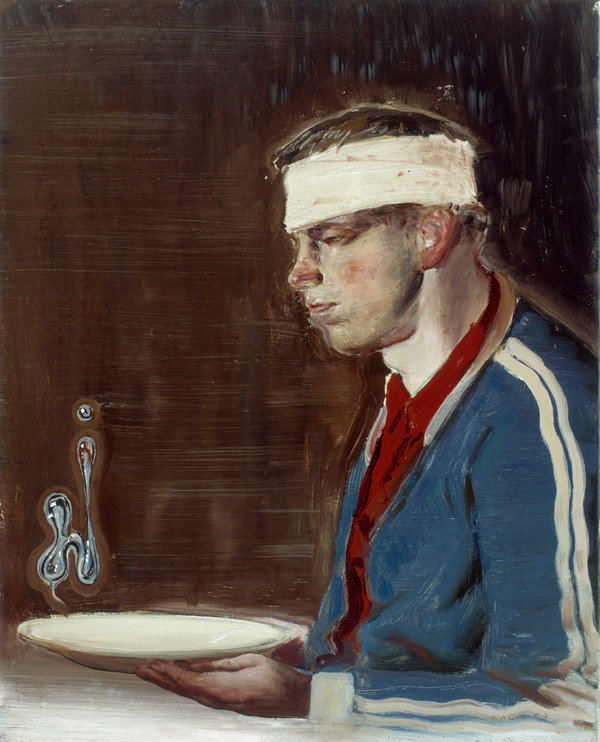Exhausted Heroes
dal 15/2/2012 al 12/5/2012
Segnalato da
15/2/2012
Exhausted Heroes
Hamburger Kunsthalle, Hamburg
The exhibition deals with the utopian ideal of the 'New man' and its history in the 20 century. In the oeuvre of the three painters featured in this exhibition - Ferdinand Hodler, Aleksandr Dejneka and Neo Rauch - the radical transformation of this ideal can be observed in exemplary fashion.

curated by Hubertus Gaßner, Daniel Koep and Markus Bertsch
Ferdinand Hodler – Aleksandr Dejneka – Neo Rauch
The exhibition Müde Helden (Exhausted Heroes). Ferdinand Hodler – Aleksandr Dejneka – Neo Rauch
deals with the utopian ideal of the ‘Neue Mensch’ (‘new man’) and its history in the 20 century. In the
oeuvre of the three painters featured in this exhibition, the radical transformation of this ideal can be
observed in exemplary fashion. It starts with the proclamation of the ‘new man’ at the beginning of the
20 century, leads on to the political appropriation of the ideal in the vision of a socialist order, and ulti-
mately draws to a close with the abandonment of all idealism after the end of Communist rule in the
East Bloc in the late 1980s.
The art of the Swiss painter Ferdinand Hodler (1853–1918) is deeply rooted in the ideals of the ‘life
reform’ movement. The discourses of a ‘new man’ that featured so prominently, and with great pathos,
in the Lebensreform movement naturally found their way into his paintings. Despite their monumental
appearance, his large-scale renditions of both female and male figures are marked by a measure of
decoration and affectation. To the degree that Hodler subdued the heroism of his figures, they are here
presented as tired, or ‘exhausted heroes’.
Kursk-born painter Aleksandr Dejneka (1899-1969), was a leading representative of post-
revolutionary painting in Russia between 1918, the year of Hodler’s death, and 1932, when Socialist
Realism was proclaimed as the official art of the Soviet Union. In his subject matter, in the painterly
modeling of his figures, and in their gestures and posture, Dejneka closely appropriates the model of
Hodler’s figural compositions and relocates them in a post-revolutionary Russian context – a process
that has hitherto gone unnoticed. In this way, for instance, Dejneka transforms Hodler’s blossoming
nature into an industrial landscape under construction. His working women and men appear like a
renewal of the Swiss painter’s symbolist works in proletarian guise.
After the fall of the Berlin wall in 1989, the painter Neo Rauch (*1960), who grew up and was edu-
cated in East-Germany, takes up exactly the type of figure developed by Hodler and Dejneka. In con-
scious reference to the heroes of technology and industry from the ‘Twenties and ‘Thirties, Rauch’s
figures are frozen in meaningless postures, performing inhibited actions and quixotic rituals in late
industrial settings. The utopian vision of a ‘new man’ is here turned into a complete denial of any faith
in progress or ideology of any kind.
In the exhibition Müde Helden the oeuvre of Neo Rauch, the internationally renowned representative of
the ‘Leipzig School’ of painting, is for the first time presented in a historical and an art-historical per-
spective. Moreover, the exhibition offers a singular opportunity to discover the oeuvre of Aleksandr
Dejneka, a painter very highly-esteemed in Russia, who is represented by a large number of important
works that have never before been shown in Germany. In thematically ordered references to the large
number of works by their modern predecessor, Ferdinand Hodler, the exhibition presents a historical
development from the ‘New Man’ around 1900 to the contemporary figure of a ‘Tired Hero’.
The exhibition comprises more than a hundred large-scale paintings as well as prints and drawings.
Curators: Prof. Dr. Hubertus Gaßner, Dr. Daniel Koep und Dr. des. Markus Bertsch
Image: Neo Rauch (*1960), Quicksilver, 2003 © courtesy Galerie EIGEN + ART Leipzig / Berlin und David Zwirner, New York. Photo: Uwe Walter, VG Bild-Kunst, Bonn 2011/12
Mira Forte
Kommunikation
Hamburger Kunsthalle
Glockengießerwall
D-20095 Hamburg
Tel. +49 (0)40. 428 131 204
Fax +49 (0)40. 428 542 978
forte@hamburger-kunsthalle.de
presse@hamburger-kunsthalle.de
Press Conference: Thursday, 16 February 2012, 11 a.m.
Opening: Thursday, 16 February 2012, 7 p.m.
Hamburger Kunsthalle
Gallery of Contemporary Art, first and second floor
Glockengiesserwall - Hamburg
Opening Hours:
Tuesdays to Sundays 10 a.m. to 6 p.m.
Thursdays 10 a.m. to 9 p.m.
Closed Mondays
Admission prices:
Visit to the collection, including temporary exhibitions
Adults 12 €
Concessions 5 €
Family Day Ticket 16 €
Golden Friday for Seniors aged 65 and up, 10 € (includes coffee and cake)
Children and young people under 18, free admission
Members of the Freunde der Kunsthalle e.V., free admission
Members of Malschulvereins in der Kunsthalle e.V., free admission



